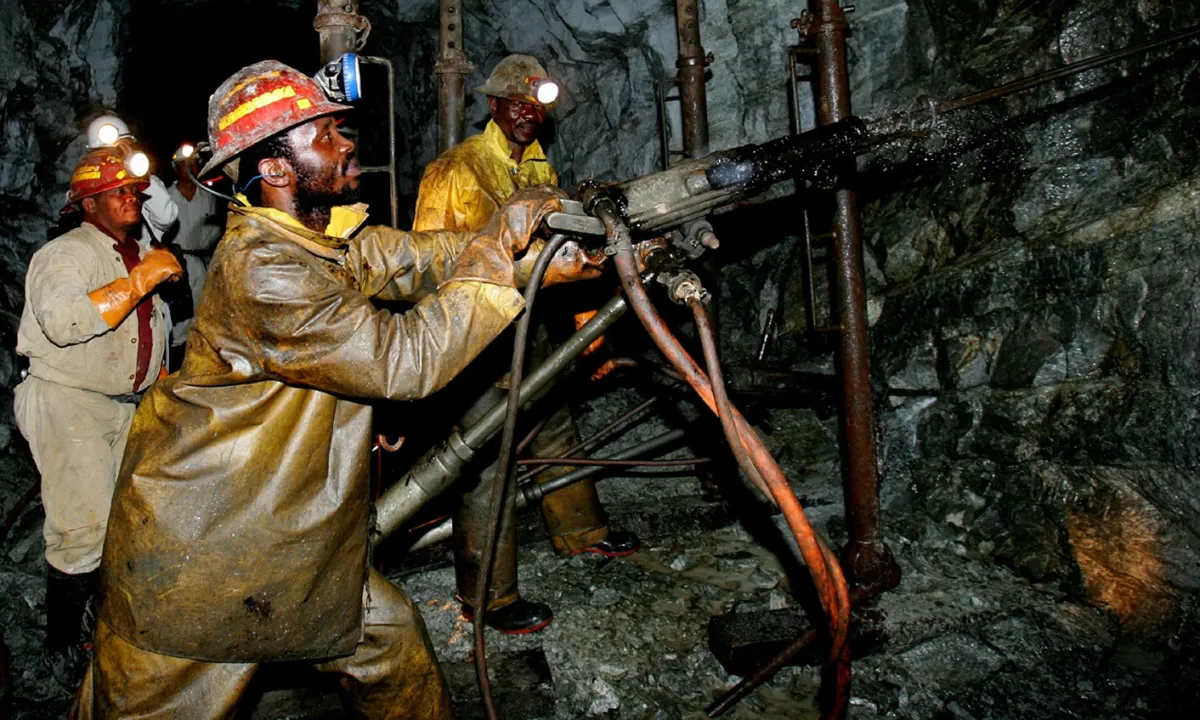Africa will not accept that it "should just continue to be a source of raw materials" for the rest of the world, the African Union's Trade Commissioner has said.
Albert Muchanga says instead his continent wants a future of "genuine and mutually beneficial relationships" with its trade partners. It comes as the AU's chair has been invited to the G7 summit in Japan amid intensifying competition with China for Africa's natural resources.
With Western powers seeking greater trade links with the continent, there have been visits to a host of African countries in the run-up to the summit from the leaders of France and Germany, as well as the US vice-president. Japan's Prime Minister Fumio Kishida visited Egypt, Ghana, Kenya and Mozambique at the start of this month as he sought to bolster African support for his efforts to counter Chinese and Russian influence on the continent, as well as in regards to Taiwan and Ukraine.
Speaking in Maputo on 4 May he said: "Many countries of the so-called Global South are hurt and suffering from high food and energy prices. The cause of this issue should be traced to Russia's invasion of Ukraine."
Mr Muchanga welcomes the recognition of Africa's problems. He says: “The disruption caused by the Covid pandemic is also to blame for problems that are multi-dimensional. It's a recognition of that the North and the South want deeper interdependence, and it's welcome."
The Zambian official says that with the era of colonialism now in the past, Africa wants to get more benefit from that relationship by equipping itself with the skills to keep more of the economic value from its vast natural resources. He said: "We are not going to continue as the historical sources of raw materials. It will not work because of a growing population, which wants opportunities for decent jobs, and that can only come from the processes of manufacturing and agro-processing."
"A good example has been given by DRC and Zambia, when they're going to come up with a joint project on the production of batteries for electric vehicles." The two countries are major exporters of the copper and cobalt needed for the batteries, which are in growing demand around the world.
The United States is trying to boost its trade ties with Africa as it seeks to tackle climate change. During a visit to Tanzania in March, Vice-President Kamala Harris highlighted a project which will benefit from US financing, which she said was a "first-of-its-kind processing facility on the continent for minerals that go into electric vehicle batteries".
"Importantly, raw minerals will soon be processed in Tanzania, by Tanzanians. It will help address the climate crisis, build resilient global supply chains, and create new industries and jobs." Last year, China's trade relationship with Africa reached a record $282bn (£226bn), according to Chinese customs data.
That marked an 11% increase from the year before as prices for commodities such as oil, copper, cobalt and iron ore surged. It also means Africa-China trade is nearly four times as big as US-Africa trade, which came in at $72.6bn. However, "more manufactured and value-added products are shipped to the US than are shipped to China", according to Florizelle Liser, who runs Corporate Council on Africa, a Washington-based organisation that aims to boost US-Africa trade.
Ms Liser adds: “Africans whether in government or the private sector really do like working with US companies for a variety of reasons. They liked the American brand.
"They liked the fact that working with the Americans, often there's more transparency in the relationship. And they also like the fact that US companies do a lot in terms of skills transfer, and in technology transfer, and they don't necessarily see this with all the other partners, China as well as others."
That lack of transparency in trade relations was criticised recently by outgoing World Bank President David Malpass, who said he was concerned about the long-term implications of Chinese loans to Africa and called for international financial support to be more transparent.
Billions of dollars have been spent on projects such as ports, railways and electricity grids. Despite the economic benefits, it has left countries including Ethiopia, Ghana and Zambia struggling to repay their debts amid claims that China is using them as leverage for political influence to support its demand for natural resources.
During a visit to Beijing by Gabon's president last month, China's Vice-Foreign Minister Deng Li denied that was the case, saying: "We are not bringing a so-called 'debt trap'. We are bringing development opportunities. We have never attached any political strings to our aid and economic assistance to African countries."
The African Union's Mr Muchanga says: "China has really done quite a considerable job in promoting infrastructure deployment across Africa through the Belt and Road Initiative. However, he says transparency in trade relations is very important. "There should be no hidden clauses. Unfortunately, there have been hidden clauses in the past."
He adds that "at the negotiating table before the deal is signed, everybody should be very clear on what they're signing on. I think that's the lesson that we need to take into the future."
One way Africa is trying to strengthen its hand in trade deals is through the development of the African Continental Free Trade Area. The flagship project of the African Union is aimed at eliminating trade barriers and boosting trade within the continent but has yet to be fully implemented.
"The next stage is to move it to an African Customs Union," explains Mr Muchanga, who hopes that eventually AfCFTA will allow its 54 members to strengthen its negotiating hand with the rest of the world on trade in a similar manner to the European Union. Mr Muchanga says that the AU's invitation to the G7 summit is "a recognition of the systemic influence of Africa to the global economy".
"Africa should really be able to speak very strongly with one voice on all global economic issues."











